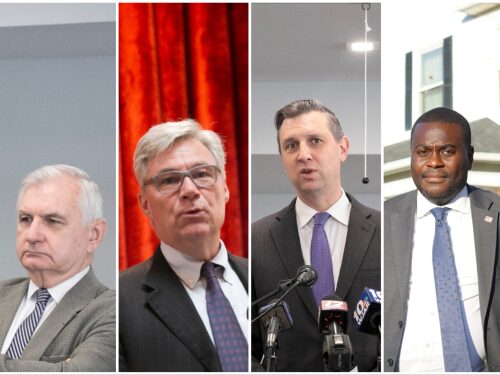All four members of Rhode Island’s congressional delegation have asked to have their congressional pay withheld for the duration of the federal government shutdown in a show of solidarity with federal workers.
Democratic U.S. Sens. Jack Reed and Sheldon Whitehouse and U.S. Reps. Seth Magaziner and Gabe Amo all announced Wednesday afternoon that they intend to decline their paychecks until the federal government is reopened and public servants are paid.
Throughout the federal shutdown, all four congressional offices have remained fully open.
Congressional pay is set by law and not subject to the annual appropriations process. Article I, Section 6 of the U.S. Constitution guarantees compensation for members of Congress.
The base salary for a U.S. senator and U.S. representative is $174,000 per year.
“It’s not clear to me they can force the Treasury to keep their money,” Roger Williams University School of Law Professor Peter S. Margulies said. “I’m not sure they have the power to do that.”
Margulies said congressional delegates could at least put their money into an escrow account or donate to a nonprofit aimed at helping federal workers.
“There are plenty of things they could do to show solidarity if their goal is they don’t want to pocket their pay,” he said.
Forgoing pay is an idea that’s being embraced by members of Congress of both political parties. On Sept. 30, Democratic U.S. Sen. Andy Kim of New Jersey requested that his pay be withheld. That same day, Republican U.S. Rep. Cat Kammack of Florida posted a copy of her request on X and U.S. Rep. Stephanie Bice of Oklahoma submitted her request.
Then on Oct. 1, the first day of the shutdown, Democratic U.S. Rep Janelle Bynum of Oregon submitted a letter to the House’s chief administrative officer requesting to have her pay withheld.
“Members of Congress should play by the same rules as the people they represent,” Bynum wrote. “I do not think it would be right for me to continue to be paid while many public servants in Oregon are not receiving their salaries through no fault of their own.”
Republican U.S. Rep. Mike Kennedy of Utah introduced a bill that would prohibit members of Congress from receiving their pay during any period in which the federal government is shut down.
“This measure is about restoring fairness and accountability,” Kennedy said of his bill, titled “No Work, No Pay Act of 2025,” in a statement issued Oct. 1. “If we’re not going to pass a budget, we’re not going to fund the government, we shouldn’t get paid either. I just think that’s totally appropriate.”
This story was originally published by the Rhode Island Current.







